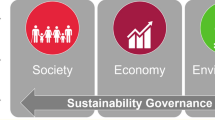Abstract
If tacit ethical ideals shape policy and practice, even when practitioners are not fully aware of underlying philosophical assumptions, then philosophical frameworks that support diagnostic, evaluative, and adaptive capacity in the sphere of action are critical to sustainability. Thompson’s agrarian-influenced sustainability framework substantially advances beyond the prevailing triple bottom line approach, as experimental evaluation of biofuels sustainability illustrates. By suggesting that governance of complex social-natural systems lies at the core of contemporary sustainability challenges, Thompson illuminates the critical importance of social capacity for deliberation and choice—a powerful and somewhat unexpected theme requiring more development by philosophers and practitioners alike going forward.


Similar content being viewed by others
Notes
“Resilience is … the ability to absorb disturbances, to be changed and then to re-organise and still have the same identity (retain the same basic structure and ways of functioning). It includes the ability to learn from the disturbance. A resilient system is forgiving of external shocks. As resilience declines the magnitude of a shock from which it cannot recover gets smaller and smaller. Resilience shifts attention from purely growth and efficiency to needed recovery and flexibility. Growth and efficiency alone can often lead ecological systems, businesses, and societies into fragile rigidities, exposing them to turbulent transformation. Learning, recovery and flexibility open eyes to novelty and new worlds of opportunity” (Resilience Alliance 2010).
References
Allen, W. (2010). Keynote address, “Growing food and community in the City,” Food in bloom: Cross-pollination and cultivation of food systems, cultures, and methods. Joint annual meeting of the Association for the Study of Food and Society; Agriculture, Food and Human Values; and The Society for the Anthropology of Food and Nutrition, Bloomington, IN, 2–5 June 2010.
Batie, S. (2008). Wicked problems and applied economics. American Journal of Agricultural Economics, 90(5), 1176–1191.
Beinecke, R. (2009). Introduction: Leadership for wicked problems. The Innovation Journal: The Public Sector Innovation Journal, 14(1), 1–17.
Biomass Research and Development Board (BRDB). National Biofuels Action Plan. (2008). http://www1.eere.energy.gov/biomass/pdfs/nbap.pdf.
Buttel, F. (2003). Environmental sociology and the explanation of environmental reform. Organization & Environment, 16(3), 306–344.
Center for American Progress. (2010). It’s easy being green: Finding vegetables in unexpected places. http://www.americanprogress.org/issues/2010/07/ebg072110.html.
Fargione, J., et al. (2008). Land clearing and the biofuel carbon debt. Science, 319, 1235–1238.
Graffy, E. A. (2008). Meeting the challenges of policy-relevant science: Bridging theory and practice. Public Administration Review, 68(6), 1087–1100.
Ingram, H. (1995). Interest groups and environmental policy. In J. P. Lester (Ed.), Environmental politics and policy: Theories and evidence. Durham: Duke University Press.
Kettl, D. (2002). Environmental governance a report on the next generation of environmental policy. Washington, D.C.: Brookings Institution Press.
Nash, R. (1989). The rights of nature a history of environmental ethics. Madison, WI: University of Wisconsin Press.
National Research Council. (2010). Expanding biofuel production: Sustainability and the transition to advanced biofuels, Summary of a workshop. (National Academies Press, Washington, DC) http://sites.nationalacademies.org/PGA/sustainability/biofuels/index.htm.
Norton, B. G. (2005). Sustainability: A philosophy of adaptive ecosystem management. Chicago: University of Chicago Press.
Paavola, J. (2002). Rethinking the choice and performance of environmental policies. In D. Bromley & J. Paavola (Eds.), Economics, ethics, and environmental policy: Contested choices. Malden, MA: Blackwell Publishers.
Resilience Alliance, http://www.resalliance.org/564.php.
Sandler, R. (2010). Ethical theory and the problem of inconsequentialism: Why environmental ethicists should be virtue-oriented ethicists. Journal of Agricultural and Environmental Ethics, 23(1–2), 167–183.
Sands, P. (1999). Sustainable development: Treaty, custom, and the cross-fertilization of international law. In A. E. Boyle & D. Freestone (Eds.), International law and sustainable development: Past achievements and future challenges. New York, NY: Oxford University Press.
Searchinger, T., et al. (2008). Use of US croplands for biofuels increases greenhouse gases through emissions from land use change. Science, 319, 1238–1240.
Sheehan, J. (2009). Biofuels and the conundrum of sustainability. Current Opinion in Biotechnology, 20, 1–7.
Sorensen, A., & Daukus, J. (2010). Policy approaches to energy and resource use in US agriculture. Renewable Agriculture and Food Systems, 25(2), 109–117.
Thompson, P. (2007). Agricultural sustainability: What it is and what it is not. International Journal of Agricultural Sustainability, 5(1), 5–16.
Thompson, P. (2009). Conceptualizing sustainability: The interplay between science and values. Presentation at the Annual meeting of the Society for Social Studies of Science, Washington DC, December.
U.S. Congress, Office of Technology Assessment (OTA). (1995). Agriculture, trade and environment: Achieving complementary policies. OTA-ENV-617. Washington, DC: U.S. Government Printing Office.
World Commission on Environment and Development. (1987). Our common future: The Brundtland report. Oxford: Oxford University Press.
World Wildlife Fund (2008). Kathryn fuller science for nature fund, science for nature symposium. Biofuels—Which are more sustainable? Washington, DC. 19–20 November. http://www.worldwildlife.org/science/fellowships/fuller/WWFBinaryitem10473.pdf.
Author information
Authors and Affiliations
Corresponding author
Rights and permissions
About this article
Cite this article
Graffy, E. Agrarian Ideals, Sustainability Ethics, and US Policy: A Critique for Practitioners. J Agric Environ Ethics 25, 503–528 (2012). https://doi.org/10.1007/s10806-011-9338-y
Accepted:
Published:
Issue Date:
DOI: https://doi.org/10.1007/s10806-011-9338-y



